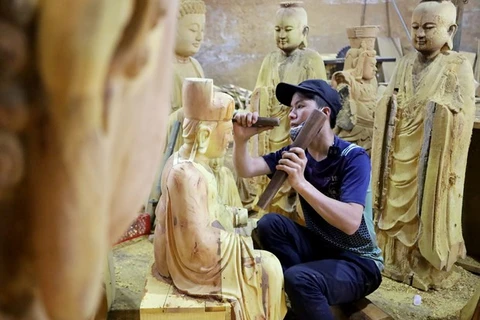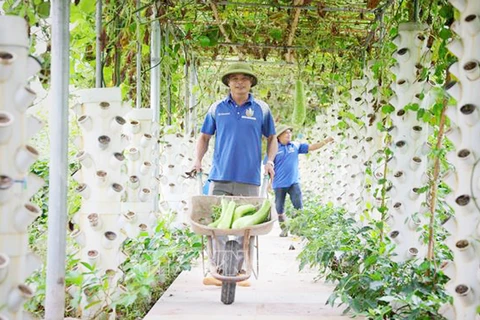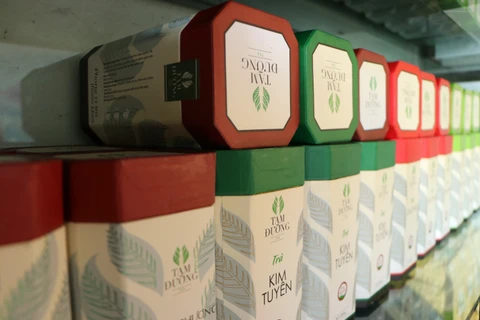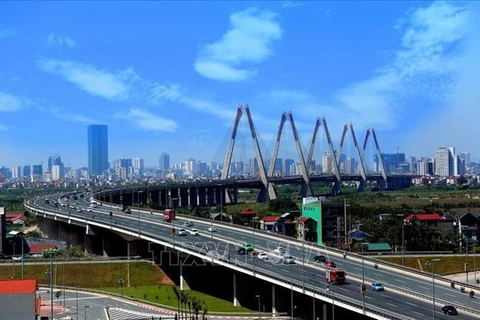 Many OCOP products of Hanoi are introduced to visitors to an exhibition held at the Royal City residential area until July 24. (Photo: VNA)
Many OCOP products of Hanoi are introduced to visitors to an exhibition held at the Royal City residential area until July 24. (Photo: VNA) Addressing a ceremony to announce the recognition on July 22, Chu Phu My, Chief of Hanoi’s Coordinating Office for the New-Style Rural Area Building Programme, spoke highly of the strong efforts made by local departments, sectors, localities and producers to carry out the OCOP programme.
He asked producers to continue improving the quality, design and packaging of the recognised products and enhance connectivity with other stakeholders in value chains to further develop their products.
In 2021, the capital city recognised 595 OCOP products, including 367 rated four stars and 228 rated three stars.
Deputy Chief of the office Ngo Van Ngon said to help producers tackle difficulties caused by the COVID-19 pandemic and resume production and business activities, the office has organised many investment and trade promotion events and assisted them to take part in similar activities in other localities such as an OCOP product forum of the Mekong Delta held in Dong Thap province and the Vietnam fruit and OCOP products festival in Son La province.
From now to the end of 2022, four events will be held in different districts of Hanoi to introduce OCOP products of not only the city but also other provinces in the northern, central, Central Highlands and southern regions.
Authorities will assist with the opening of OCOP showrooms so that these products can access more consumers city-wide. Distributors, shopping centres, supermarkets, grocery and handicraft stores and e-commerce platforms will be encouraged to tighten links with producers to boost sales of OCOP items, according to Ngon.
On this occasion, an exhibition of local OCOP products is taking place at the Royal City residential area until July 24.
So far, Hanoi has recognised 1,649 OCOP products, including four products rated five stars, 1,098 others rated four stars, and 534 rated three stars. It is taking the lead nationwide in terms of the numbers of OPOP products and five-star OCOP products.
Apart from product assessment and rating, the city has also paid attention to organising events, fairs and workshops to increase connectivity under value chains and advertise those products to other localities in Vietnam and international partners. Many showrooms of OCOP products have also been opened in tandem with the development of craft village tourism and rural tourism.
By 2025, Hanoi looks to have an additional 2,000 OCOP products rated at least three stars, all communes that meet advanced criteria of the new-style rural area building programme having OCOP products, and at least 70% of OCOP product makers being cooperatives, cooperative groups and businesses.
Meanwhile, the municipal People’s Committee also made a plan on developing agricultural and rural tourism in tandem with new-style rural area building during 2022 - 2025, part of efforts to boost sustainable tourism development.
In this plan, each suburban district holding potential and advantages for agricultural and rural tourism will develop from one to three community-based tourism services or sites, with at least 50% of those products registered for intellectual property protection and recognised as three-star or higher products under the OCOP programme.
The OCOP programme was initiated by the Ministry of Agriculture and Rural Development in 2008, based on Japan’s “One Village, One Product” and Thailand’s “One Tambon, One Product” programmes. It is an economic development programme for rural areas and also to help implement the national target programme on new-style rural area building.
OCOP products are made basing on the combination of local resources, traditional culture, and advanced technology, thus promoting product diversification, quality, packaging, and origin traceability.
The programme has provided farmers with the chance to come together to form cooperatives, which in turn have enabled farmers to create goods with better quality, design, and packaging that meet higher standards and match market demand./.
VNA
























